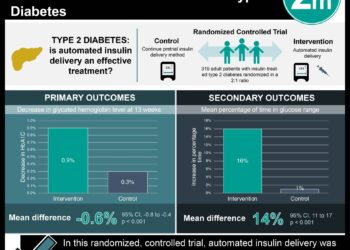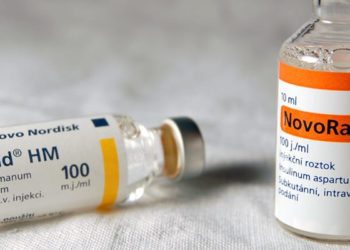Antipsychotic users more likely to develop Type 2 Diabetes
Image: PD
1. Children and adolescents prescribed antipsychotics were three times more likely to develop Type 2 Diabetes.
2. The risk of diabetes increased in a dose dependent manner with increasing cumulative doses of medication.
Evidence Rating Level: 2 (Good)
Study Rundown: This study found that the prescription of antipsychotics was associated with a three times increased incidence of Type 2 Diabetes in children. Moreover, this risk was dose-dependent. While the metabolic effects of antipsychotics (such as Risperdal, Seroquel, and Zyprexa) have been extensively demonstrated in adults, there is much less information on their effects in children.
Strengths of this study include its large sample size, matched study design and the large magnitude of effect estimates. This study population was limited to Medicaid enrollees, which may limit generalizability. Additionally, diagnosis and medication use are subject to recall bias. Future investigations might compare the relative risks of specific antipsychotic drugs in the pediatric population.
Click to read the study in JAMA Psychiatry
Relevant Reading: Uptodate: Pathogenesis of Type 2 Diabetes Mellitus
Study Author, Dr. Wayne Ray, PhD, talks to 2 Minute Medicine: Vanderbilt University School of Medicine, Division of Pharmacoepidemiology, Department of Preventative Medicine.
“The primary clinical implication for our study is that for conditions for which there are alternatives to antipsychotics, these alternatives should be carefully considered before starting an antipsychotic. If an antipsychotic is started, there should be careful monitoring for metabolic effects. Further studies may include looking into the relative efficacy and safety of therapeutic alternatives for psychiatric conditions in children”
In-Depth [retrospective cohort]: This study identified children ages 6-24 years enrolled in Tennessee Medicaid via a combination of Medicaid records. Children with newly filled antipsychotic prescriptions (n=28,858) were compared with matched controls with newly filled non-antipsychotic, psychotropic drugs, such as mood stabilizers, antidepressants, and benzodiazepines (n=14,429). Controls were matched using a propensity score composed of 115 covariates including demographics, previous psychiatric diagnoses, and metabolic disorders. The main outcome evaluated was newly diagnosed diabetes after beginning the psychiatric medication, identified by either new diagnosis or diabetes medication prescription.
In a total of 55,984 person-years of follow-up, youth prescribed antipsychotics were significantly more likely to be diagnosed with type 2 diabetes than controls (HR=3.03, 95% CI=1.73-5.32). This increased risk was significant as early as the first year of follow-up (HR=2.49, CI=1.27-4.88). Moreover, this risk was found to increase in a dose-dependent manner based on cumulative dose of the medication (p<0.04). Risk remained elevated up to 1 year after discontinuing the antipsychotic medication (HR=2.57, CI=1.34-4.91).
By Maren Shapiro and Leah Hawkins, MD, MPH
More from this author: IUD contraception equally safe in teenagers as in older women, Black men less likely to receive follow-up for elevated prostate cancer marker, PSA, Intake of fish fatty acids associated with lower risk of breast cancer, USPSTF recommends chemoprevention for women at high risk for breast cancer, Insurance status affects treatment of early stage breast cancer, SERMs decrease breast cancer risk even after treatment
© 2013 2minutemedicine.com. All rights reserved. No works may be reproduced without expressed written consent from 2minutemedicine.com. Disclaimer: We present factual information directly from peer reviewed medical journals. No post should be construed as medical advice and is not intended as such by the authors, editors, staff or by 2minutemedicine.com. PLEASE SEE A HEALTHCARE PROVIDER IN YOUR AREA IF YOU SEEK MEDICAL ADVICE OF ANY SORT.







